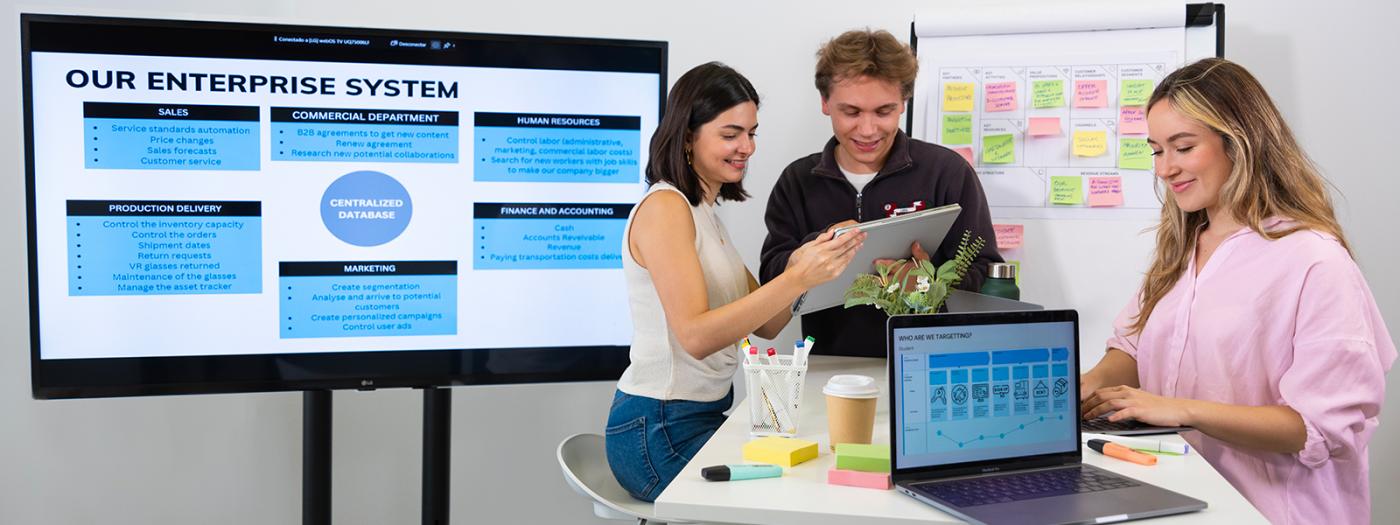The degree in Managing Exponential Technologies is designed as an integral journey into the entrepreneurial business mindset and skillset. Exponential Emerging Technologies plays a key role in that journey. It will transform the way the student interact and feel the world. Thinking about the future raises' awareness of the need for change.
Through Exponential emerging technologies the student will shift from a Scarcity mentality (seeing life as a finite pie) to Abundance mindset that refers to the paradigm that there is plenty of opportunities for everybody.
The students will learn how to start training their mind to loosen its focus and create an expanded awareness.
If we succeed with this course, the students will understand that they are living in the best of the times but simultaneously have a massive opportunity for improvement; things could be so much better, and a vision of a wildly better world is deeply inspiring.
We think this course is spot on with covering all the most relevant "game changer" topics that are going to affect our near future. This course, and what it teaches should be at the really core of any degree, but especially business (together with practical philosophy). Not because I personally like it, but because it exposes all the relevant topics that our engineers, scientists, politicians and entrepreneurs could find meaning working on.
Unit 1 - Elephant in the room
Unit 2 - If not you who?
Unit 3 - The bold Crowd
Unit 4 - If not now when
Unit 4.1 - The art of innovation material
Unit 5 - Is this the world we have created?
Unit 6 - NASA is anybody out there
Unit 7 - Uncomfortable truths & Entrepreneurship tricks and tips
Unit 8 - Biomimicry Inspiration from Nature
Unit 9 - Connecting abilities - Why what we do matters
The class is thought and planned as student centric education. It means that focus of instruction is shifted from the teacher to the student. The course is focused on encourage students to be actively involved in their own learning and helps them take ownership of their education.
This involves creating an environment in which students feel free to ask questions, raise concerns and participate in the learning process. For that reason, student participation in class it is a must. Active student participation ensures that all student needs are met.
For that reason:
Reading assignments: This will play a key role in all our methodology. Read text assignments prior to class and be prepared to discuss the text material, answering instructor questions orally with well-organized thoughts and ideas.
Class participation. The learning process will be focused on peer-to-peer learning. When one or more students teach other students, sharing experiences and discoveries.
Learning by doing. Students are encouraged to learn through experiences that can help them to know and be familiar with the latest technological breakthroughs and push the students to take action in front of our Global Challenges.
Your final grade consists of:
Class attendance: (10%)
Concepts such as student centric education, peer-to-peer learning and learning by doing implies student active participation in class.
It is required student, physically or virtually, attend to the class.
Students are permitted 3 absences without penalty.
Punctuality: (10%)
Respect for your time and that of others.
Participation in class. (20%)
As said before, active participation is what make sense in this course. Come to class ON TIME, PREPARED to take part in the class discussions and other activities. You will be assessed on the QUALITY of your comments and your ability to CONNECT with and build upon the comments made by your colleagues. Your participation assessment includes not only your contribution to your own project, but also the constructive feedback you give to help your classmates' projects succeed.
You are required to prepare all assigned reading prior to class.
Knowledge deliveries (40%)
This course is planned as a journey.
Learning by doing approach means that during the different sessions it will be asked several deliveries (homework) that should be presented on time.
Deliveries would be requested orally, pwp presentations in class and pdf in the platform.
In order to have access to the final exam requires a minimum of 80% of requested deliveries.
Knowledge mid Term (10%) and Knowledge final exam (10%)
Mid term and final exam. Time to evaluate the achieved goals.
If you have below 3.5 as a final course score, you are not eligible for a re-take exam.
